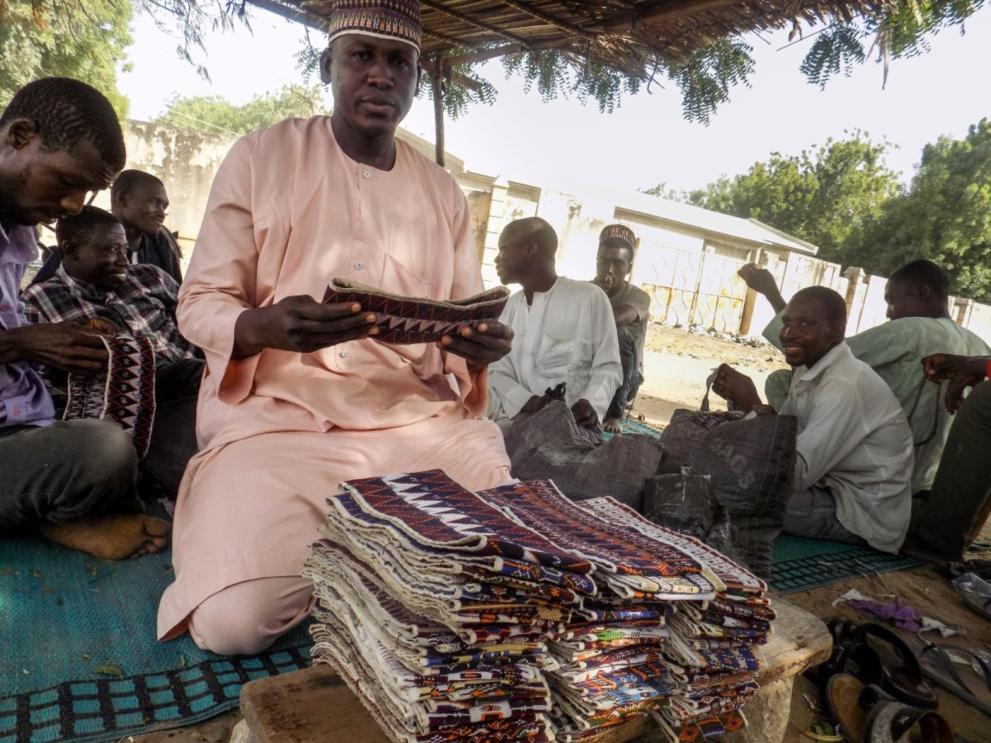
Sitting on the ground in a circle surrounded by other young men, 35-year-old Mbusube Alhaji Modu carefully weaves locally sourced strands to produce decorative caps of varied sizes and vibrant colours.
“I can create any design of cap I see” - he proudly says.
Modu is taking his future into his own hands and turning a harsh reality into a positive opportunity.
Three years ago, Modu and his family fled his village following intense fighting between members of an armed opposition group and the Nigeria Army in Bama. Tragically, many of their neighbours were killed or injured during the clash.
Modu’s family is part of the nearly 2 million people affected by displacement in northeast Nigeria. Fleeing from the conflict, people have often walked as far as 60km to find safety. Neighbouring communities where they face life-threatening challenges of meeting basic survival needs for shelter, food, healthcare, and protection of their rights.
The Norwegian Refugee Council (NRC), with the support of th European Union through the EU Emergency Trust Fund for Africa is responding by working to improve access to shelter, food, water, and livelihoods, with a focus on promoting and protecting their dignity and rights.
Creating Opportunities
Sustainability is at the heart of all our support for displaced people. With funding from the European Union, NRC conducted micro-enterprise training for nearly 3,000 women and men affected by displacement in Kusheri and Modusullumri communities in Maiduguri.
“During the training, they taught us how to package our business to attract customers and how to save” - says Modu, who along with other participants received a start-up grant of NGN 43,500 ($121) to start or boost their small businesses.
“The training focused on helping them understand and engage in income generating activities” – says NRC’s food security officer Judith Oyakhire in Maiduguri.
Working with a local community-based organisation, NRC trained the participants on how to start and manage small businesses, how to save part of their incomes, and how to attract customers. NRC worked with the participants to identify and prioritise marketable business ventures and to develop concrete business plans to ensure their financial success.
The training had a wider aim of improving community resilience and allowing economic recovery of people affected by displacement in northeast Nigeria.
“When I came to Maiduguri three years ago, I could only make and sell two caps per week. But after the business training and the grant issued to me, I now make and sell over 50 caps weekly” – says Modu.
From his cap business, Modu makes a profit of between NGN 8,000-10,000 (equivalent to $22-28) which he uses to pay for the rent of his two-room apartment, cater for his wife, four children, an aged mother, and two of his sisters. He also keeps a portion of his weekly income as savings in the bank and plans to use this money to expand his business in the future.
“No other organisation has this kind of initiative. I thank NRC for not just giving me food and other supplies, but for helping me to become an entrepreneur” - he said.
Read more on NRC website
Details
- Publication date
- 12 March 2018
- Region and Country
- Nigeria
- Thematic
- Strengthening resilience of communities
- Partner
- Norwegian Refugee Council
- Danish Refugee Council
- International Rescue Committee
